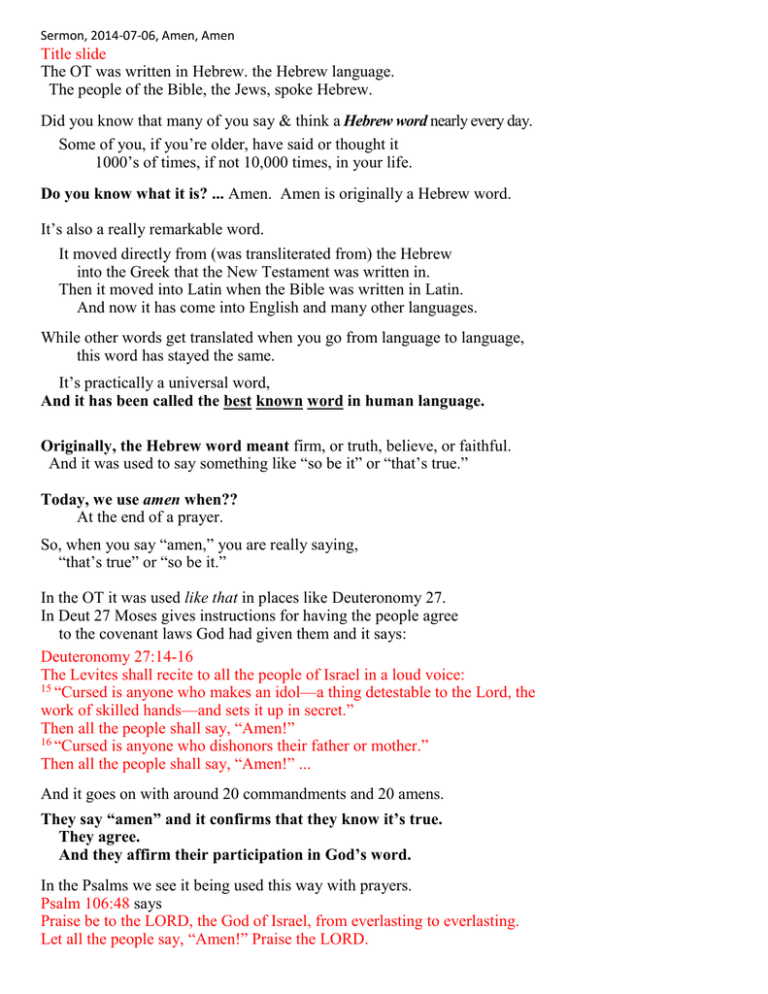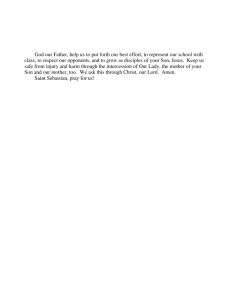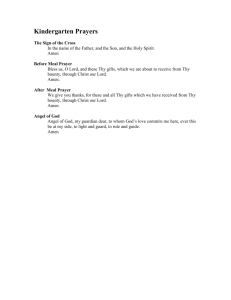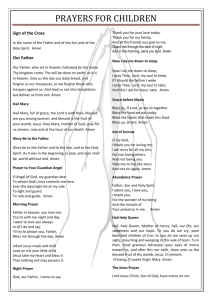They say “amen”
advertisement

Sermon, 2014-07-06, Amen, Amen Title slide The OT was written in Hebrew. the Hebrew language. The people of the Bible, the Jews, spoke Hebrew. Did you know that many of you say & think a Hebrew word nearly every day. Some of you, if you’re older, have said or thought it 1000’s of times, if not 10,000 times, in your life. Do you know what it is? ... Amen. Amen is originally a Hebrew word. It’s also a really remarkable word. It moved directly from (was transliterated from) the Hebrew into the Greek that the New Testament was written in. Then it moved into Latin when the Bible was written in Latin. And now it has come into English and many other languages. While other words get translated when you go from language to language, this word has stayed the same. It’s practically a universal word, And it has been called the best known word in human language. Originally, the Hebrew word meant firm, or truth, believe, or faithful. And it was used to say something like “so be it” or “that’s true.” Today, we use amen when?? At the end of a prayer. So, when you say “amen,” you are really saying, “that’s true” or “so be it.” In the OT it was used like that in places like Deuteronomy 27. In Deut 27 Moses gives instructions for having the people agree to the covenant laws God had given them and it says: Deuteronomy 27:14-16 The Levites shall recite to all the people of Israel in a loud voice: 15 “Cursed is anyone who makes an idol—a thing detestable to the Lord, the work of skilled hands—and sets it up in secret.” Then all the people shall say, “Amen!” 16 “Cursed is anyone who dishonors their father or mother.” Then all the people shall say, “Amen!” ... And it goes on with around 20 commandments and 20 amens. They say “amen” and it confirms that they know it’s true. They agree. And they affirm their participation in God’s word. In the Psalms we see it being used this way with prayers. Psalm 106:48 says Praise be to the LORD, the God of Israel, from everlasting to everlasting. Let all the people say, “Amen!” Praise the LORD. Sermon, 2014-07-06, Amen, Amen They say “amen” and it confirms that they know it’s true. They agree. And they affirm their participation in the prayer. Then, in the New Testament, it appears a lot. Can anyone tell me what is the last word in the Gospel of Matthew? Amen. Who can tell me what is the very last word in the Gospel of Mark? Amen. Okay, who’s paying attention. :) Can anyone tell me the very last word in the Gospel of Luke? Amen. Can anyone tell me the word that is the last word in the Gospel of John? Amen. All four gospels end with amen! Who knew that?! It’s their way of saying “all of this is true. Everything I wrote in this record of Jesus, I affirm it is true!! Same thing in Romans, 1 Cor, 2 Cor, Gal, Eph., Phil, 1 Tim, 2 Tim, Hebrews, 1 John, 2 John – almost every NT letter – last word: Amen! And who knows what the last word in the Bible is? Amen! Some of these books close with prayers. So it fits that way. But all of them end with amen because it’s how they say, “This is true!” And now the most important thing. In the gospels Jesus is recorded as saying amen nearly 100 times. BUT, check this out, he only ONCE uses it to close a prayer or end a saying – at the end of the Lord’s prayer in Matt 6. EVERY other time, Jesus says it at the beginning of his sayings. He says things like: Matt 17:20 “Truly I tell you, if you have faith as small as a mustard seed, you can say to this mountain, ‘Move from here to there,’ and it will move.” Matt 18:3 “Truly I tell you, unless you change and become like little children, you will never enter the kingdom of heaven.” Sermon, 2014-07-06, Amen, Amen Matt 18:18 “Truly I tell you, whatever you bind on earth will be bound in heaven, and whatever you loose on earth will be loosed in heaven. Matt 19:23 “Truly I tell you, it is hard for someone who is rich to enter the kingdom of heaven.” Truly here in the English is the word amen in the original manuscript. In the original it was “Amen, lego su.” – “Truly I tell you...” Jesus is saying, “What I am about to say is truth!” When Jesus uses it like this, the amen is translated for us because it makes it much clearer – it needs it. It means “true, truly, I affirm this is true. And Jesus says it a lot! And here’s another really interesting thing about how Jesus uses amen. In the Gosp. of John, Jesus always says it twice at the beginning of his teaching. John 3:3 Jesus replied, “Very truly I tell you, no one can see the kingdom of God unless they are born again.” John 6:47 Very truly I tell you, the one who believes has eternal life. John 8:34 Jesus replied, “Very truly I tell you, everyone who sins is a slave to sin. Very truly in the original manuscript is literally, “Amen, Amen.” For you who remember the KJV it was “Verily, verily, I say to thee Verily was a form of the Latin veritas – the Latin word for truth. Truly, truly - amen, amen. It makes me think of Matthew McConaughey when he says “Alright, Alright, Alright.” Jesus said Amen, Amen, Amen. And the reason he’s doing it . is for emphasis. He says it twice to be emphatic. Jesus is saying “This is really true. Listen!” And here’s the thing, Jesus is recorded saying amen this way nearly 100 times in the gospels! If you search the word truly in an online Bible in NIV it’s remarkable how frequently Jesus does this – how it’s everywhere! It’s in Matthew 5, Matt 6, Matt 6 again, Matt 8, Matt 9, Matt 10. And over and over and over in chapter after chapter. Go home and search it - truly in NIV and it will drop your jaw. Sermon, 2014-07-06, Amen, Amen At the beginning of his words, Jesus is always affirming: “What I am about to say is truth!!” If you’re familiar with Jesus’ teachings, you can look right past it. It’s so common. Truly I tell you... Truly I tell you ... But we are NOT meant to ignore this! Jesus was always saying his teaching are true! Jesus is affirming what he says is the truth! Jesus is emphatic that we see his teachings as truth! Title slide. We are talking about Taking Jesus at His Word Here, this, is a strong, compelling reason for you to take Jesus at his word. Jesus repeatedly, over and over again, asserted that his teachings, his sayings, his words were truth. He started much of what he said with, “Amen I tell you. Or “Amen, amen! I tell you. He wants us to hear Him. He wants us to believe Him. He wants us to take Him at his word. Today, to encourage us to take Jesus at his word, I’d like to share a few propositional statements about Jesus’ truth. I think this is the best way for us to appropriate and apply this insight into how Jesus repeatedly said he was speaking the truth, If you like, maybe you could jot these down and that can help you remember. The first thing we can say about Jesus’ truth is ... 1. Jesus’ truth is dependable. You might feel like me at times and think, “What can I trust anymore?” It’s hard to trust our government. It’s hard to trust all kinds of institutions, people let us down, our medicines are counterfeits, and on and on we could go. Jesus started what he said so much with “amen, amen,” in part, because he wanted people to know that his words were trustworthy, his words were faithful. Psalm 33:4 says For the word of the Lord is right and true; he is faithful in all he does. What can you trust in life? Sermon, 2014-07-06, Amen, Amen Jesus’ word is truth. Jesus’ word is faithful. Jesus’ words are trustworthy. These days it’s popular for those who don’t know much about how the Bible has been passed down to us to assume that so much of it is unreliable – that we cannot really know what Jesus said because the Bible has been changed as it passed from language to language. But I can tell you that is not the case; the Bible is reliable. - We have more than 5,000 hand written copies (manuscripts) of the NT from the first 3 centuries alone. - Some are nearly complete and some are small fragments. - And, our English Bibles are written from careful analytical study of these earliest original manuscripts. - In the process of copying by hand there a some errors or differences, but they amount to only 1 in a 1000 words being questionable. - And, if all the words in question were put together in a modern New Testament, they would fit on a single page. - And not one significant teaching or doctrine of Christianity would be affected by the questionable words or differences. - And if we didn’t have one single early manuscript of the NT, we could recreate the entire thing, less a handful of verses, from the other writings that people made in NT & early church times. Jesus’ words are trustworthy. And if you live them, they prove themselves in another sense. If you live his teachings, you will find they are true and dependable. 2. Jesus’ truth is assertable. Jesus truth is assertable. That means it can be put forth, claimed, argued, asserted. Jesus asserts his truth claims. He says, “Amen, Amen, I tell you. He says “This is truth, listen! He teaches his truth. He instructs people on what is true and what is right and wrong. He says things like John 3:11 Very truly I tell you, we speak of what we know, and we testify to what we have seen, but still you people do not accept our testimony. Our modern world says, “Your truth is fine for you. But keep it to yourself.” Sermon, 2014-07-06, Amen, Amen This is a main tenet, or idea, of a philosophy called ethical relativism. This is a subtle, widely accepted view today that is false according to Jesus and according to logic. There are really two presuppositions of ethical relativism cultural diversity and cultural dependency. Cultural diversity is the idea that as we look around the world there are lots of different beliefs, lots of truths and lots of cultures. That is true. Cultures are diverse. But the second assumption is faulty. It says since there is diversity in truth across cultures, truth must depend on culture. That can’t be the case. If truth is truly dependent on a group or culture, what prevents the Nazi’s from being right in killing Jews. In their culture, their group, they held as true that Jews deserved extermination. But we know this can’t work in the real world, if someone’s truth is diametrically opposed to or morally abhorrent to others. Some cultures in Africa practice female circumcision. Other cultures find it morally abhorrent and unacceptable to allow girls to be mutilated like that. But if truth is culturally dependent, We shouldn’t be able to judge them or assert our truth on them. But we find our truth says we must. So something is wrong with this view, this system. Timothy Keller, a modern Christian author gives a good rebuttal of it. He says, Is there anyone in the world right now doing things you believe they should stop doing no matter what they personally believe about the correctness of their behavior? If the answer is yes (and it always is), then there ARE moral constraints in the universe that we believe must be obeyed. -- Timothy Keller, The Reason for God Jesus came and he asserted the highest and best moral constraints that man can know and live by. Our world says, “Since your truth is your truth and my truth is my truth, we should keep our truths to ourselves.” That’s false. Jesus did not keep his truth to himself. Jesus’ truth is assertable. 3. Jesus’ truth is incarnational. Incarnation means to be made flesh. It’s how Jesus was God who became a man. Sermon, 2014-07-06, Amen, Amen In John 1 the Bible says, John 1:14 The Word became flesh and made his dwelling among us. We have seen his glory, the glory of the one and only Son, who came from the Father, full of grace and truth. Jesus came from God and he was truth with skin on. He didn’t just think truth or speak truth, He lived it. And in the book of Revelation it says, Revelation 3:14 “To the angel of the church in Laodicea write: These are the words of the Amen, the faithful and true witness, the ruler of God’s creation. Jesus is the amen, the faithful and true witness. He is the truth. Jesus embodied his truth. Jesus’ truth is not just a set of abstract ideas and teachings. It’s a way of life. We as his follows can live his truth. We can incarnate his truth just as he did. Ad we can do it, so that others can see Jesus’ truth in us. Jesus’ truth is incarnational. Last one, 4. Jesus’ truth is transformational. Jesus said, John 8:31-32 To the Jews who had believed him, Jesus said, “If you hold to my teaching, you are really my disciples. Then you will know the truth, and the truth will set you free.” I have to interrupt here with a little story. Friday my wife and son and I went to the free concert in the park in Grbg. On the way there, I was on Rte119 as it turned into Main St in S Grbg, I was surprised to see flashing lights in my rear view mirror. And he followed me as I pulled over. I was going 43 in a 30. I got my first ticket in 20 years. We went to the free concert in the park, which was good. And since I met Beth there, she left early in her own car. Same road. Same place. Same policeman. 45 in a 30 going the other direction. Same result. Sermon, 2014-07-06, Amen, Amen On hearing of his mother’s misfortune on top of mine in route to and from the free concert, our son said, “I guess that proves the old adage, nothing in life is really free.” He was last seen walking home on route 119 in South Grbg. I reserve the right to use that story again for different reasons. I would like to get my money’s worth out if it. Jesus said if you know the truth, his truth, it will set you free. Some people in our world today would say, “That’s the thing that’s wrong with Christianity. It claims to tell people what truth is. And that limits people’s freedom. Well known anarchist Emma Goldman called Christianity “the leveler of the human race, the breaker of man's will to dare and to do ... an iron net, a straitjacket which does not let him expand or grow.” That’s because most people today equate freedom with the right to do whatever you want. That, however, is false. In The Reason for God Timothy Keller challenges this idea, with the idea that that view is only possible if there is no purpose in life. Like for example, the striving of a musician or an athlete is constricting, they can’t do anything as they pursue their purpose. But in their discipline they achieve wonderful freedom in their pursuits. The purpose of loving God and others out of gratitude for the grace of God is wonderfully freeing. But loving others, true love, is constraining. Healthy loving relationships involve mutual unselfish service, a mutual loss of independence. Jesus’ highest truth is this - love God and love others. That is truth that has consistently show itself and proven itself to be true. I’ll close with this. I went to Swaziland, Africa a few years ago with Jim and Sandy Hall and a group from W.PA. Dorcas Croft is a missionary educator there that we as a church support. She adopted a Swazi boy named Matthias as a baby. When we were there she showed us a video of Matthias at around 7 yrs old preaching his first sermon. It was real. Sermon, 2014-07-06, Amen, Amen He prepared it and he had an outdoor church gathering who was loving it. And, I guess because of how they do things in the churches he grew up in ever line of his sermon was followed by: “Amen?” “Jesus loves you. Amen?” And the people all smiled and said a big: “Amen!” “He will forgive you of your sins. Amen?” And the people gave a big: “Amen!” You need to give your life to him. Amen? And the people were thrilled and gave big: “Amens!” And on and on it went. It was all true! And it was so cute. We don’t go that far around here with the amens But, we should say amen when someone says something that is God’s truth! Amen? We should say amen when someone prays and we agree with that prayer. Amen? And when we say that amen at the end of the prayer, now we know what it means. Amen? And we should say “amen” when something a pastor or teacher says that we want to be true for us or we want to come true for us. Amen? We should say amen because Jesus used it often to affirm his truth. Amen? And Jesus’ truth is dependable. You can trust it! Amen? Jesus’ truth is assertable. You can share it. Amen? Jesus’ truth is incarnational. You can live it. Amen? And Jesus’ truth is transformational. You can let it transform you. Amen? Praise the Lord! Amen!









